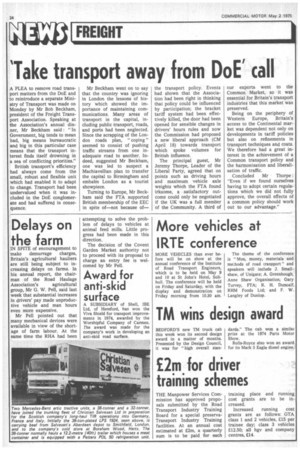'Take transport away from NE' call
Page 26

If you've noticed an error in this article please click here to report it so we can fix it.
A PLEA to remove road transport matters from the DoE and to reintroduce a separate Ministry of Transport was made on Monday by Mr Bob Beckham, president of the Freight Transport Association. Speaking at the Association's annual dinner, Mr Beckham said : "In Government, big tends to mean bad, big means bureaucratic and big in this particular case means that the transport interest finds itself drowning in a sea of conflicting priorities."
British transport's efficiency had always come from the small, robust and flexible unit which had enabled it to adapt to change. Transport had been undervalued when it was included in the DoE conglomerate and had suffered in consequence. Mr Beckham went on to say that the country was ignoring in London the lessons of history which showed the importance of maintaining communications. Many areas of transport in the capital, including public transport, roads, and ports had been neglected. Since the scrapping of the London roads plan, " coping " seemed to consist of pushing traffic streams from one inadequate road to another. Indeed, suggested Mr Beckham, one was led to suspect a Machiavellian plan to transfer the capital to Birmingham and embalm London as a tourist showpiece.
Turning to Europe, Mr Beckham said the FTA supported British membership of the EEC in spite of—not because of— the transport policy. Events had shown that the Association had been right in thinking that policy could be influenced by participation; the bracket tariff system had been effectively killed, the door had been opened for sensible changes in drivers' hours rules and now the Commission had proposed a new liberal approach (CM April 18) towards transport which spoke volumes for British influence.
The principal guest, Mr Jeremy Thorpe, Leader of the Liberal Party, agreed that on points such as driving hours and maximum vehicle axle weights which the FTA found irksome, a satisfactory outcome could only be negotiated if the UK was a full member of the Community. A third of our exports went to the Common Market, so it was essential for Britain's transport industries that this market was preserved.
Being on the periphery of Western Europe, Britain's access to the Continental market was dependent not only on developments in tariff policies but also on refinements in transport techniques and costs. We therefore had a great interest in the achievement of a Common transport policy and the harmonisation and liberalisation of traffic.
Concluded Mr Thorpe : "Even if we found ourselves having to adopt certain regulations which we did not fully approve, the overall effects of a common policy should work out to our advantage."
























































































































